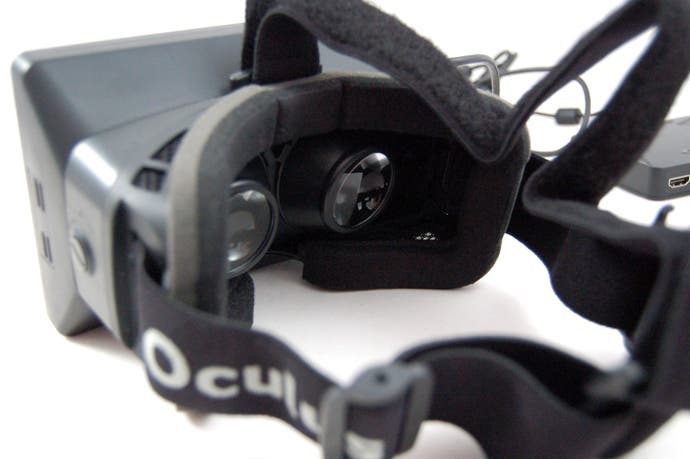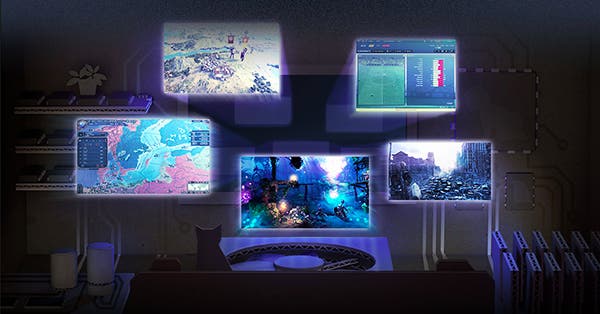Carmack, Sweeney and Andersson Unplugged
The big three rendering architects effectively did an AMA at the G-Sync launch. Here's the transcript.
Virtual Reality and the Steam Machines
In this part of the discussion, we learn more about John Carmack's full-time move from id Software to VR specialist Oculus VR and how Epic and DICE are dealing with virtual reality. We also get some interesting insight into SteamOS and the Steam Machines, Valve's new initiative which aims to bring the PC into the living room, running on an open source operating system.
Epic is looking at it entirely from the software side because [of the] work that Oculus, Valve and others are doing... we had the opportunity to work with a lot of the early stuff. It's just mind-boggling. You know, I feel like right now it's not ready for prime time, that the hardware needs another generation or two and the software needs a lot of work. You know, we took this Infiltrator demo that we did for GDC last year or earlier this year and we got that working on Oculus Rift and it's amazing. You're walking around this high fidelity environment on a four teraflop GPU and the quality and immersiveness is just astonishing, and we think that's going to play a role in the entire industry.
It is still in the research phase and we're looking at how that fits into our engine and our games. We're looking at how to put all of that together into the next-generation pipeline it's going to go through. You know, if you look at what happened with iPhone over the last five generations I think we're going to see back-to-back revolutionary improvements in technology with one product after another as Oculus goes from "it's ready for developers but not quite ready for one hundred million gamers yet" to being something that absolutely changes the face of gaming.
There's actually something that's not immediately obvious and it's a little frightening from inside Oculus that, because all of this is driven by mobile displays, it means that we are tied to the mobile product cycle and the mobile product cycle is brutal. It's not like we could even buy the displays and say like we don't care about shipping something new this year because they're just not even going to be available for very long after the phones, and that's something that causes a little bit of distress internally where, yeah, it'd be great to ship a new headset every single year - but that's a big commitment.
"The hardware needs another generation or two and the software needs a lot of work. You know, we took this Infiltrator demo that we did for GDC last year or earlier this year and we got that working on Oculus Rift and it's amazing." - Tim Sweeney, Epic Games.

That's a good question. We've been doing quite a lot of experiments for quite some time and we're a little bit excited about it but we've been experimenting, essentially with our game world stuff that we have. Just seeing something... how does it work, what are the mechanics really, those are the difficult questions.
As Tim mentioned, all of the hard work that John and company are doing on the hardware side, that's awesome. [On] the rendering side, we have a good trajectory there but how does this affect our actual animation with a game like Mirror's Edge and it's first person animation, how does that actually feel? That's just a huge months of work for the team back in the day just for crunching consoles, essentially, how does that work when you have to look around and run in complex environments? That is something that actually takes a lot of time, not necessarily as part of the game, but just analysing these things and getting familiar with it in the studio with the actual technology and how it changes. It's quite surprising the mountains of change, the mountains of things that change within the game. So that's where we are just sort of experimenting with things and figuring it out.
This is some of the coolest research occurring in the world right now, and the issues that they are working on internally are very closely related to the problems Nvidia is solving here with G-Sync. Absolutely minimising latency between your input being received by the computer and the image on the screen and dealing with all the visual flaws... some of which are increasingly subtle but all the more important when they're mounted on your head in a virtual world. It just reminds me that our ultimate goal with these games is actually to create reality. Completely seamless experiences and not just to have players sitting on their couch in front of a TV and watching some experience. It's about putting the player in the world.
You know, I have an interesting retrospective on it. Valve approached id at the very beginning of Steam asking about large title status and if we want to put Doom 3 on Steam for launch and we basically said, are you crazy? This would be nuts to try to kind of tie yourselves to this little, notional digital distribution platform. But clearly, Valve has played a good, strong, long game and I'm afraid that I may be at that same point right now where I'm like, "making your own sort of little console OS? Are you crazy?"
And, you know, maybe ten years from now, they're going to look like brilliant prophets again with it. It still seems a little bit dicey to me, getting everything moved over to Linux, pushing from that side of things. Still, Valve's track record is evidence that the company may just be able to pull it off. If it was some other random company, I would be pseudo-scornful, but it's Valve, so I'm not.
"It still seems a little bit dicey to me, getting everything moved over to Linux, pushing from that side of things. Still, Valve's track record is evidence that the company may just be able to pull it off." - John Carmack, Oculus VR.

Yeah, my first impression of that was, wow, trying to build a mainstream platform around Linux is nuts but I think right now, in terms of market share month to month sales, Linux is actually the number one consumer operating system, so it's interesting.
I think with Valve, it's not like a Microsoft or Sony launch where there's this billion dollar marketing event and suddenly tens of millions players show and it happens. I think Valve is going to look at this, like you said, as a really long term effort, they're going to build it up over time and it's going to [grow] slowly, you know. But we had a presentation at Epic where Gabe Newell told us all about the plans for Steam in 2013 and it's kind of like, "are you crazy about this? Over that decade they made it work and I could really see there's a lot of fear around... from the major publishers and major developers of being tied down to platforms that are ultimately tied by Microsoft, Sony or others. That absolute control over certification is scary and their control over e-commerce rules out possibilities where we'd like to have direct communication with our customers and they prevent it.
The possibility of Steambox as a real, genuinely open platform based on Linux with multiple manufacturers that, you know, is jump-started by Valve, but isn't absolutely controlled by Valve, in the same way that Microsoft and Sony control their platforms. It's very interesting. You know I think it will also go a long way towards steering the console manufacturers in pursuing an enlightened path and I think Sony has been really good in that direction, letting game developers actually access the outside internet on PlayStation 3 and 4. Having the platform that's less locked down and that's technically possible... Valve is a great factor in keeping all of them honest. It's going to be interesting and you can't judge this over the next six months, you're going to have to judge it over the next decade.
I agree also, it will be interesting to see how the consumer behaviour works with it. I was initially a little bit sceptical of the SteamOS just, well, essentially just the name, SteamOS, you have Steam and the operating system built on that. I can see that working but then Valve's commitment to having it as an open platform there and really going with Linux's strengths... that actually makes it a lot more interesting, [it] makes it a really quite open environment and an alternative to some of the other closed platforms there. It will take a long time to see where it's actually going but I'm initially very positive to it.
